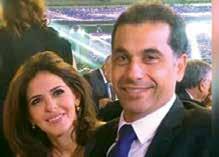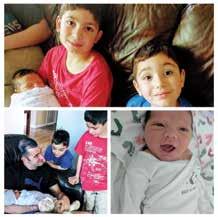
4 minute read
The Thing
ANDREW BISMAR
Accepted at McGill, Toronto University, and British Columbia
My ‘thing’ is effective time management. I do sailing, tennis, ping pong and swimming as hobbies as well as scouts. I am on the IC Badminton team and am also the class representative. I also volunteer with an NGO that cares for disabled children.
MAHER ABDEL SAMAD Accepted at UPenn, Columbia and Johns Hopkins
My ‘thing’ is my ambition and energy. I love to be a leader. I was a class representative for two years. I also helped organize and headed the MUN trip to India, where my team won the best delegation and I received a trophy. I am also the ViceCaptain of the IC Varsity Rugby team. I teach English and SAT to underprivileged kids and teenagers. In my spare time, I help out the guidance counseling office here at IC. I like to help other kids find their passion. On the side of all this, I am also a professional DJ. I trained to be a DJ at a music school and earn my own pocket money by being a DJ at parties.

The ‘ThIng’: how to Get Into Top Universities
Marie Assir, Head of Admissions and Career Guidance, put it very well.
“Universities are looking for the ‘thing’.”
What thing?
“The thing that makes you different,” she said. “Your passion.”
With up to 80,000 applications a year raining down on top universities, grades and SAT scores just aren’t enough.
Thus, the ‘thing’.
And that could be almost anything. Well, as long as it is special. It could be a virtuoso violinist, a philanthropic initiative, a committed volunteer, an inspiring artist, a tennis champion or maybe a twirling ballerina.
“Universities are looking for students who go beyond the grades and SAT scores,” she said. “Everyone who is applying to top universities has high grades and top SAT scores.”
So, basically it comes down to: What are you doing outside the classroom?
Or, as IC’s President Dr. Don Bergman put it, “what do you bring to a university community?”
Unlike Lebanese universities, most US students have left home and are living in the university compound. Over the years, these microcosm compounds have become more or less self-sustaining. Naturally, universities look for students who can bring an ‘added value’ to these compounds.
“They are looking for a diverse group of community participants,” said Dr. Bergman. “They don’t just want allstar athletes, engineers or doctors or architects. They want what reflects the society as a whole. They want different passions.”
It came as a shock to many IC
students in the fall, when Bergman and Assir accompanied seven students on a US university tour. Their peers – and competitors – offered so much more than just good grades. “The kids we were meeting were so interesting,” recalled Assir. “They were horseback riding, they were playing music, they were into drama, into chess. They were just fascinating people. And this is what got them into their universities.”
By the end of the trip, IC students came back resolved to get more involved in extracurricular activities and fine tune their passion or ‘thing’– something they should have started in their Middle school years.
But, ultimately, they are not to blame. Truth be said, a heavy Lebanese government imposed academic curriculum, coupled with a wide parental belief in an academics-only schedule, is actually inhibiting many students from getting accepted in top US universities.
A fact that has not gone unnoticed by IC’s President. In fact, it was the first thing he noticed when he took office three years ago. It has been his ultimate challenge to find a heathy balance between an unnecessarily heavy academic schedule and extracurricular activities.
“We need to change the paradigm of thinking,” he said. “100% pass rates on Brevet and Baccalaureate exams is admirable, but we have to value and intentionally support many other factors to optimize our students’ opportunity for happiness and success in life. I ask myself, “how much collateral damage do we leave behind in our relentless pursuit of academics? For how many kids do we not provide sufficient support and encouragement or contribute to unnecessary stress and anxiety? We have many bright and talented kids who don’t neatly fit into the narrow profile that is part of both the Lebanese and IC culture. The message we are giving students is that their unique interests, talents and passions are not as important as the traditional cultural and institutional ones.”
But there is good news. Many IC students have been able to do both: excel at academics and pursue their passions. They are, as Assir says, “unique”.
“So, go ahead, and find your passion,” she said.
After all, it is ultimately those passions – and not the degree – that leads to a happy life.

KAREN ABDALLAH Accepted at Cambridge University (Law)
My ‘thing’ is that I am not afraid to speak my mind. I can take the pressure and fight back. I think I got this by participating in MUN for three years. One time, I had to defend something I don’t even believe in. But that is the way it is going to be when I become a lawyer. Cambridge knew this and I think liked this part of me. I am also involved with the CISV, an NGO which aims to spread local peace through youth. At the same time, I managed to keep up my piano and violin practices.
EVA MALIK
Accepted at Notre Dame University, USA
My “thing” is that I have been in the choir since grade one. I learned to manage my studies and choir rehearsals as well as performing arts. I also participated in several AMIS concerts. I am also part of the environment club.











